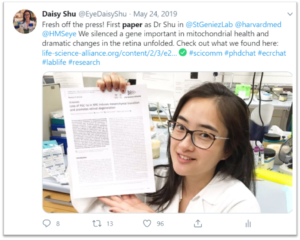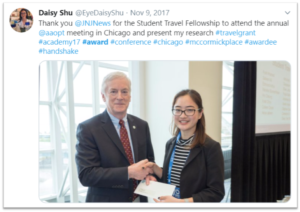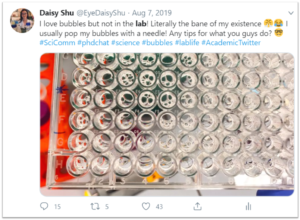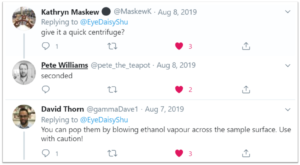Have you ever considered that social media could actually prove useful in your research? In this blog, Dr Daisy Shu, postdoctoral research fellow at the Harvard Medical School, reflects on how sharing her scientific research journey through social media has benefited her career. If you are keen to find out what academic Twitter is all about from a fellow scientist, have a read!
During the first year of my PhD at the University of Sydney, I attended a talk by Hugh Kearns called “Shameless self-promotion”, where the importance of getting yourself and your research out there was emphasized. I went home that day and created a Twitter account with the handle “@EyeDaisyShu”, since I was obsessed with all things eye research. I had no idea what to post or who to follow so I just left it as it was.
Two years later I attended a networking event by Franklin Women, where we were encouraged to tweet using the official hashtag for the event. Exploring posts under this hashtag, I saw dozens of tweets from scientists who also attended this event. I realized that there was a whole new world of buzzing activity occurring online whilst the actual networking event was taking place. I got really excited and started following these people, interacting with them both in-person and over Twitter.
Fast forward to 2021, I’ve now realised Twitter is so much more than just a means of interacting with people at conferences, and can be as much about building an online scientific research community. We can share our latest publications, crowdsource tips for optimising experimental protocols and build new research collaborations. And above all, I love that the scientific Twitter community is so supportive in congratulating each other on their latest accomplishments and lifting each other up with funny gifs and memes when we’re down due to paper rejections or frustrations with our experiments. The more scientists there are on social media, the more we can build a great scientific network facilitating instant and global interactions in a public setting.
What are some things one could I tweet about?
Twitter is a fantastic way to stay up to date with the current literature and draw attention to publications. Getting your paper retweeted multiple times may increase its likelihood of being seen, read and above all, cited! If you’ve just published a paper, snap up a photo of you with your paper, tag the journal and your co-authors and link the paper. Twitter is a unique platform for promoting yourself and sharing your career accomplishments where you can build your own online community with whom you might share research interests.
Post any awards you win! Here’s a photo of me getting awarded my travel grant for the American Academy of Optometry conference.
Promote your upcoming talks on social media to increase your audience and link the registration details:
If you’re struggling with any experimental protocols, crowdsource some ideas from your Twitter following:
So many fantastic suggestions from my followers:
This sounds exciting! Where do I start?
First things first, start a science-specific social media account. When deciding on a Twitter name or “handle”, keep it professional. If you’re a PI running your own lab, it could just be your lab name or perhaps your name with PhD at the end of it. If you’re a PhD student, you can also add PhD in your handle and clarify that you’re currently a PhD student. Also, I highly recommend investing in your own personal website to showcase all of your accomplishments, and collate all of your online profiles (e.g. social media, LinkedIn and ResearchGate).
In what way has the use of academic Twitter surprised you?
As part of my outreach activity at the inaugural ARVO Science Communication training program in 2017, I decided to crowdfund my PhD research project on cataract research. Using social media (including Twitter), I reached a broader, more global audience and connected with incredible people who shared stories about how cataract had personally affected them. They were passionate about supporting my crowdfunding campaign and spreading the word. To my surprise, I exceeded my crowdfunding goal!
So, what are you waiting for? Open a new tab and start tweeting about science!






